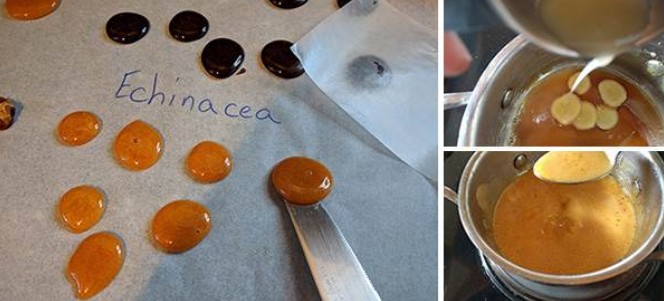 👉 Make It at Home from the Field of Master Mind Herbs (MMHRB) 🍃
👉 Make It at Home from the Field of Master Mind Herbs (MMHRB) 🍃
Shared from the research of: Joseph Mercado 🙇
Article Author: Sherra V. – The Lost Herbs 👩
To: Herbalist Lover 🌿
Blog Post #1123 📌
Re: Cough Drops 🌱
Date and Time: Tuesday, February 9, 2021 at 11:47 a.m. ⏰
Dear Herbalist Lover,
During the cold season or any time when air quality is poor or there are other airway irritations, having your own homemade cough drops can help soothe and relieve coughs and sore throats.
If you enjoy making candy, preserves, or other confections, you will love the addictive process of making your own cough drops.
We are going to start with making the cough drop base and then exploring different ways to add throat-soothing ingredients.
There are four recipes below with photos that elaborate on different techniques in creating your own cough drops.
This way, you can use what you have on hand and be as creative as you like in crafting your comforting cough drops.
Cough Drop Base:
The cough drop base is made from caramelizing a sweetener.
You might use sugar, honey, or even maple syrup, or molasses.
As honey has excellent soothing capabilities and is antibacterial as well, the recipes below all have a raw honey base.
To use sugar, you would dilute one part sugar to two parts water and boil down to a caramel-like consistency.
You might try regular white sugar, raw organic sugar, or try experimenting with other types of sugar such as coconut sugar as some sugars may also contain some healthful components.
How to Make Your Own Cough Drops:
Choosing other sweeteners like maple syrup or molasses can also help add nutrients, vitamins, and minerals to help combat a cough due to a cold.
They also are known to have a lower glycemic index than regular sugar making them safer for people with diabetes and other sugar-related issues.
Raw local honey is something I almost always have on hand, so it was the easiest choice when building these cough drop recipes.
It can go toe to toe with over-the-counter cough medications when it comes to its throat-soothing capabilities.
Raw honey is not only soothing to sore throats, but it is also packed with nutrients, antibacterial and antifungal properties, and antioxidants, making it an excellent ingredient to use when making your own cough drops.
- To caramelize honey, bring honey to a boil and stir consistently.
- The honey or sweetener needs to reach about 250 to 300 degrees F. It is important not to let it burn.How to Make Your Own Cough Drops – Echinacea 2
- I bring it to a boil and let it foam two to three times. Honey reaches a dark brown, gem-like color.
How to Make Your Own Cough Drops – Echinacea 2
When the honey has reached the desired consistency, you can do a spoon test to see if it will start to solidify at cooler temperatures.
To do the spoon test, you just drop a small amount of caramelized honey on a spoon.
Adding Flavors That Help Sore Throats And Coughs:
There are several ingredients that can make your cough drops even better.
It is easy to add things that relieve sore throats and help to combat coughs, colds, or breathing difficulties.
Ingredients containing menthols such as peppermint and eucalyptus are an option and can make your cough drops refreshing while helping to open the airway.
You might want to use items that have soothing, immune-boosting properties such as elderberry syrup or echinacea.
A favorite is using citrus flavors such as lemon which also combine excellently well with the bacteria-fighting compounds in ginger.
Yet, another way to go is to use the numbing, anti-inflammatory, anti-viral components of cinnamon and clove.
Again, you can be as creative as your imagination allows when creating comforting homemade cough drops.
Ways To Include Helpful Cough Drop Ingredients:
There are many ways to infuse your cough drops with beneficial cough-fighting combinations.
The first way is to simply make a strong tea which is then boiled into the cough drop base.
This may take a bit of extra time to boil down to a caramel-like consistency, but it is worth it in the cold-fighting recipe below for Honey Echinacea Cough Drops.
Another option is to use real, whole ingredients such as in the recipe for Honey Lemon Ginger Cough Drops.
These are the yummiest of the cough drop recipes and they do retain a sticky, gooey consistency.
Possibly the easiest, tidiest way to include healthful ingredients is to add food-grade essential oils such as you will find in the Honey Peppermint and Eucalyptus Cough Drop recipe.
Including fresh, ground, or dried herbs and spices is one more way to make delicious, sore throat relieving cough drops.
This is the method shown in the recipe Honey Cinnamon and Clove Cough Drops.
The recipe uses ground spices which gives the cough drops a grainy texture which adds to the numbing effects.
You might choose to cook the cough drop base with whole spices such as cinnamon sticks and whole cloves and removing them before making the cough drops.
This would give the cough drop a smoother consistency.
There are almost too many options to consider.
You can experiment and find your favorite method, or you can just simply use what you have on hand to create an excellent homemade soothing cough drop.
Recipes:
Honey Echinacea Cough Drops Made With Tea:
- 4 tablespoons raw honey
- ½ cup strong echinacea tea
- Boil the tea and let it steep for 10 to 15 minutes.
- Add it to the honey.
Let it boil together, stirring consistently for about 10 to 15 minutes until desired caramelized consistency is made.
After the concoction passes a spoon test, drop onto a clean surface such as a cookie sheet lined with parchment paper.
Peppermint Eucalyptus Honey Cough Drops Made with Essential Oils:
- 4 tablespoons raw honey
- 10 drops each of food-grade peppermint and eucalyptus essential oils.
- At the end of caramelizing the honey, once your honey has passed the spoon test, so after boiling and foaming for 10 to 15 minutes, add your essential oils.
- This way the essential oil essence is not boiled away.
- After a good stir, letting the mixture pass a spoon test, drop a good amount for desired cough drop size onto a clean surface.
Honey Lemon Ginger Cough Drops Made With Whole Ingredients:
- 4 tablespoons raw honey
- ¼ cup high-quality lemon juice
- 4 to 5 slices of fresh ginger.
Combine all ingredients before adding heat to allow the honey, ginger, and lemon flavors to mix well.
Bring all the ingredients to a boil. This combination becomes thick surprisingly quickly.
A nice surprise – candied ginger. Also, lovely to suck on with a sore throat.
I wish I had peeled the ginger first.
Drop onto a clean, dry surface. Using whole ingredients creates a stickier, gummier drop so putting it on something flexible like a silicone baking sheet or parchment paper is a good idea.
Honey Cinnamon And Clove Cough Drop Made With Spices:
- 4 tablespoons raw honey
- ½ teaspoon ground cinnamon
- 1/8 teaspoon ground clove
If choosing to use whole spices or herbs that will be removed, you might put them in the honey for a few hours or overnight prior to boiling the honey with them to deeper infuse their attributes into the cough drops.
Mix all ingredients together. Bring to a boil.
After bringing to a boil and allowing the mixture to foam two or three times, do a spoon test to see if the desired consistency has been made.
Spoon onto a clean surface.
Allow cough drops to cool to below room temperature.
I put this tray in the cold room for a few hours.
Storage:
You need to store the cough drops so that they don’t stick to each other.
You might choose to dust them in icing sugar.
I am wrapping these ones.
They are simply folded in wax paper or parchment paper.
As they do get a little too soft at room temperature, I keep them in an airtight bowl in the fridge.
To get a harder cough drop, you could add a thickener such as cornstarch, but I think this may take away from the healthful benefits.
You can use these as you would any cough drop, feeling good about knowing exactly what the ingredients are.
If a child is too young for a normal hard candy, they are probably too young for these due to choking hazard.
Also, they are taffy-like so should be sucked rather than chewed as they will stick in your teeth.
They make a wonderful, throat-soothing cough drop.
Content Source: The Lost Herbs

 Email Us a Message
Email Us a Message 

Please send us a personal message below and we will serve you momentarily.
We appreciate you visiting the MMU Global Research Directory
For more blog posts, videos, articles, and to generate more knowledge, please feel free and…





 Fly Over to the MMU Facebook Page with Hoot
Fly Over to the MMU Facebook Page with Hoot 
 Visit the MMA Facebook Group Today
Visit the MMA Facebook Group Today 
 Claim Your Own 32GB I-CHIP Think Drive Here for Only $67
Claim Your Own 32GB I-CHIP Think Drive Here for Only $67 
 Get 42 Nuggets of Native Plant & Herbal Knowledge: (11) MP4’s
Get 42 Nuggets of Native Plant & Herbal Knowledge: (11) MP4’s  + (11) MP3’s
+ (11) MP3’s  + (7) PDF’s
+ (7) PDF’s  + (4) HTM’s
+ (4) HTM’s  + (4) TXT Files
+ (4) TXT Files 